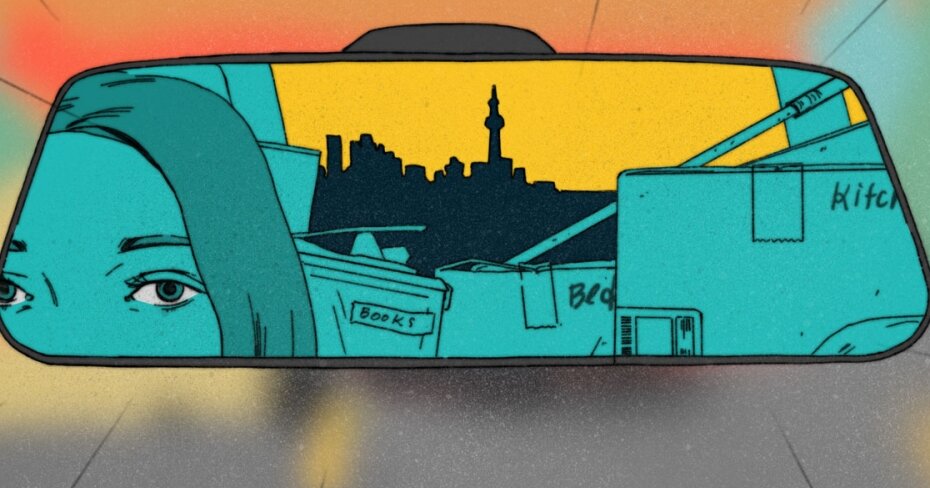When should you leave a city because it's become too expensive?
By: Lisa Coxon on February 12, 2020
For the past few years at holiday get-togethers, somebody from my extended family always asks me the same question: “So, are you still in Toronto?”
“Yeah, unfortunately,” I usually respond, with a weak laugh. “Trying to get out.”
It’s a sort of joke, but there’s some truth to it. I’ve lived in Toronto for just shy of a decade, and I’ve come to a bit of a painful realization about this city: it’s financially challenging to get into, it’s financially challenging to live in, and it’s financially challenging to leave. You need money if you want to do either of these three things.
Toronto is an objectively expensive place to call home no matter your income. It remains one of the most unaffordable housing markets in the world, and the second-most unaffordable city in Canada. A one-bedroom apartment averages $2,314 a month, a detached house averages $883,520, commuters pay nearly $140 a month to use transit, and most drivers are looking at around $2,000 a year or more for auto insurance. Throw city daycare into the mix and you could be out another $2,000 a month. Torontonians even tend to pay more than the average urbanite for things like milk and gas.
When I first started working full-time in this city, I was earning $27,000 a year. I’m happy to report that I earn well above that now, but with each and every new job or salary increase I’ve managed to secure over the years, the cost of living has only risen to match my earnings. Call it lifestyle creep, or just bad financial luck, but this has made living here feel like a never-ending race that I cannot win. Just when I think I’m gaining speed, my opponent always catches up to me.
As far as I know, there’s no This is financial suicide! warning that will blare when it’s time for me to jump ship
This didn’t always bother me. For the first five or so years I lived here, I was a student and then a new graduate. I wasn’t fussed yet about “getting ahead” or putting down roots anywhere. I was also still operating in a rather mindless state when it came to things like debt repayment. But for the last couple years, I’ve been wondering if choosing to stay in a city as expensive as Toronto is an act of financial self-sabotage. Am I making it harder for myself to be able to thrive once I leave?
There are things I’d like to achieve within the next decade — things like marrying my partner, owning a house, doing some more travelling, and maybe having a baby or two if I ever feel so inclined. But I have serious trouble imagining how I’ll ever fund those milestones if I keep living here. And so lately, I’ve been asking myself: at what point does living in an expensive city just become financially irresponsible? And how do you know when it’s time to go?
In search of greener grass
I’m not alone in this inner quandary. Torontonians are a fairly split bunch when it comes to leaving the city due to its unaffordability. According to a Forum Poll from September 2019, nearly 50% have considered leaving the city because it’s too expensive, while 52% haven’t.
My partner and I have done the math. For what we pay in rent, we could own a home worth about $300,000 in a rural area. That’s where we’d eventually like to end up, but saving up enough money to make a down payment possible feels, well, impossible.
It’s tempting to think that the expensive city is the problem — one that can be fixed simply by moving somewhere cheaper. Waiting on the other side of this concrete jungle, we assume, will be lower living costs, and an opportunity to save larger chunks of money. And for many, that is the case.
Take the couples featured in this Toronto Life story, who gave up on Toronto due to cost, congestion, and commute time, fleeing to smaller cities like Guelph, Burlington, and Brampton. For the most part, they’re all seeing their money go farther than it did in the city. Or what about the former Torotonians featured in this VICE story, some of whom halved their monthly bills by moving to Sault Ste. Marie, where the average home costs less than $200,000.
But just because you leave an expensive city doesn’t mean you leave with your same salary. Smaller cities and rural areas will often present their own hurdles, particularly fewer job opportunities and lower incomes. I’ll admit I’ve been envious in recent years of friends renting in smaller cities or rural areas who pay half of what I do in rent — and even more envious of those who’ve already managed to buy their own homes. But I’ve also learned that I’m earning more than most of these friends, and, with a quick LinkedIn search, I can see that positions in my field are scarce outside of big metropolises like Toronto or Vancouver.
It doesn’t matter where you live. Life costs money and it’s all relative
Sophia Banks, 39, is one Torontonian who knows that the grass isn’t always greener on the other side. Banks left the city, her hometown, in 2015 because of the cost. A chef at the time, Banks was struggling to afford the $900 a month she was paying to rent a single room. Still craving the accessibility of a city but wanting cheaper living costs, Banks and her partner moved to Montreal, where they paid only $600 a month for an entire two-bedroom apartment all their own.
That part was great, but being Anglophone in a French-speaking city presented professional challenges. “Montreal’s appealing in that you get large apartments for way cheaper and you can think about buying a house,” says Banks, “but then it’s also like ‘oh I’m held up in my career.’”
That challenge sparked another move for her and her partner three years later, this time to the rural town of Val David, about an hour north of Montreal. There the couple rented an entire house for $1,200 and opened a vegan café. They’d looked forward to living a less hectic lifestyle and saving money but, says Banks, “it just got more expensive.”
She and her partner were met with significantly increased vehicle costs, like an $800 car repair bill that had to be dealt with immediately since it was their only mode of transportation, and $400 a month in gas since her partner commuted into Montreal twice a week for work.
“It doesn’t matter where you live,” says certified financial planner Shannon Lee Simmons. “Life costs money and it’s all relative.”
Forfeiting access, culture, diversity
Sadly, Banks and her partner were eventually driven out of Val David after facing transphobic online reviews, as well as vandalism and arson at their café.
They might not be affordable, but big cities are often melting pots of different cultures, genders, and lifestyles, that rural areas just aren’t. And many people feel a huge pull to cities for this very reason. In fact, an Ipsos poll from 2015 revealed that despite the cost, 75% of Torontonians believe it’s worth living here largely because of the city’s diversity.
After moving to Val David, Banks found she missed other things about city life, too: yoga classes, being able to walk to the grocery store, being able to bike around, and having excellent restaurants within a close commute.
“There’s a lot of conveniences that you lose,” she says. “It’s such a catch-22.”
It works best when people have urban centre incomes with rural housing prices
Still, there are elements of rural life that are incredibly attractive. I grew up between two small towns north of London, Ont., and for the longest time, I wanted nothing more than to leave behind the slow pace of that environment for the bustle of a big city. And now, after 10 years of siren wails and noisy neighbours, I find myself craving that kind of peace and quiet. That and lower living costs, and I like to think I’d be all set.
But is it even possible to really escape Toronto prices anymore? The mass exodus of GTA earners flocking to cheaper cities in recent years has only driven up housing costs in those cities — known as the “spillover effect.” We’ve seen this happen in places like Hamilton, where the cost of a home has jumped 70% in the last five years, and even as far away as Ottawa and Sudbury.
If Torontonians want to run from the cost of living in this city, they might need to just keep on running.
How do you know when it’s time to go?
I keep hoping for some measurable indicator that says I’ve reached financial capacity as I close in on a decade in Toronto. Something to tell me that I’m just foolish to keep living here — sort of the way credit card companies tell you on your monthly statement how long it will take you to pay off your balance if you only make the minimum payment.
As far as I know, there’s no This is financial suicide! warning that will blare when it’s time for me to jump ship. But Simmons says there is a way to gauge if your living costs are holding you back.
“If your fixed expenses (housing, transportation, bills, utilities, etc.) are more than 55% of your take-home pay, you need to rethink where or how you live,” she says. “Is there a way you can earn more money? Can you rent out your home? Can you take in a roommate?”
As for Banks, she and her partner made another move just last month, this time to Vancouver, where — spoiler alert — their rent is even higher, at $1,950 a month. But Banks, who is now focusing on rebuilding her business as a food entrepreneur, is much happier than she was in Val David, and she’s able to earn more.
“There’s just so many more opportunities for careers here,” she says. “Yes, this is a more expensive city but I can also make so much more money. Even with teaching workshops, I can charge more; there’s just more money in a city.”
And that is perhaps the most ironic part of this whole conundrum. There’s more money to be made in cities, but there’s more money that needs to be spent in them, too.
“It works best when people have urban centre incomes with rural housing prices,” says Simmons. “Typically this is when people have jobs they can do remotely.”
That, I think, would be the golden ticket. Being able to live these two lives at once: enjoy the accessibility and income of a big city but retreat to the affordability and quietness of the country. But such a setup is either a rarity or tends to come with an egregious commute.
When it comes down to it, urban and rural life — and all the costs that come with each — are inherently different, and only we can decide which one brings us the most happiness and financial security.
“Leaving isn’t always the best option,” says Banks. “Are you going to be happy? Is what you want to do going to be accessible to you?”
“You have to consider: what’s the fantasy and what’s reality?”
Illustration by Taryn Gee.
432e.jpg)
b188.jpg)
